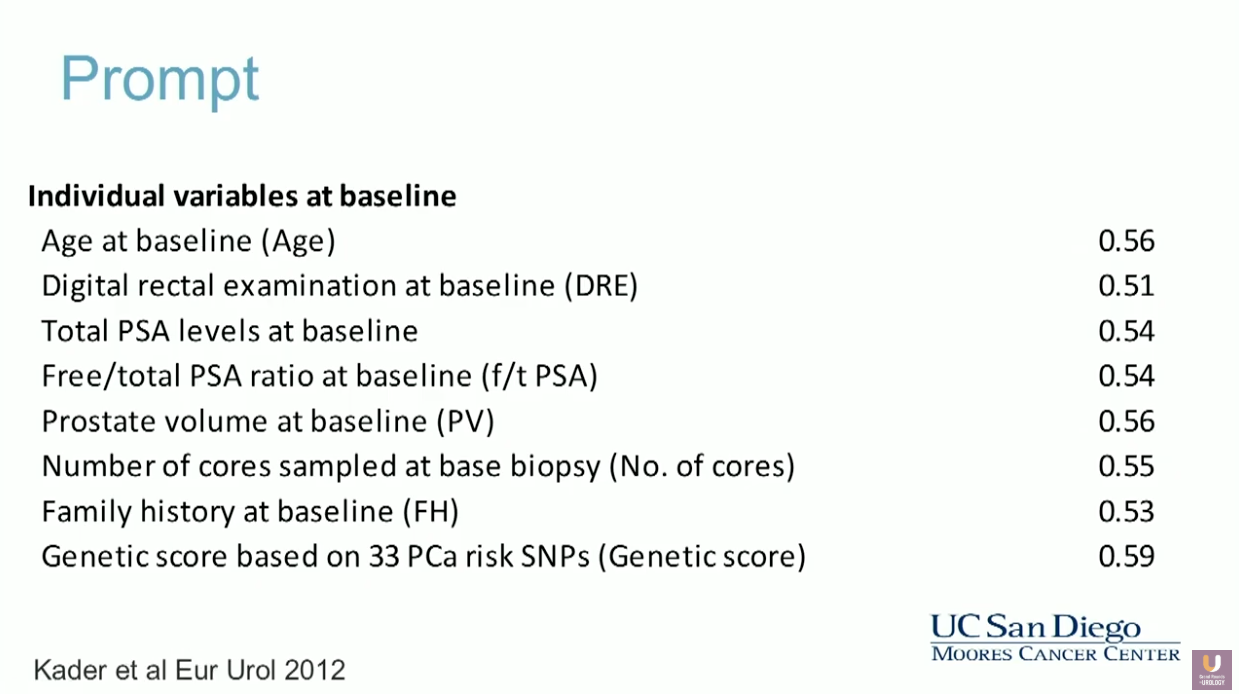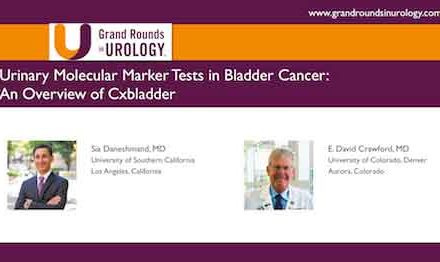Karim Kader, MD, PhD, presented “Prompt Prostate Genetic Score: A New Tool for Targeted Prostate Cancer Screening” during the 29th Annual International Prostate Cancer Update on January 26, 2019 in Beaver Creek, Colorado.
How to cite: Kader, Karim “Prompt Prostate Genetic Score: A New Tool for Targeted Prostate Cancer Screening” January 26, 2019. Accessed Dec 2024. https://dev.grandroundsinurology.com/prompt-prostate-genetic-score-a-new-tool-for-targeted-prostate-cancer-screening/
Prompt Prostate Genetic Score: A New Tool for Targeted Prostate Cancer Screening – Summary:
Karim Kader, MD, PhD, explains how controversies have led to the decline of PSA screening, and therefore fewer diagnoses and the presentation of more high-grade disease. He suggests that the use of a prostate genetic score, based on SNPs, can more efficiently guide patient selection.
Abstract:
Though PSA screening has saved lives, it may not be the most efficient way to diagnose prostate cancer (PCa). For instance, an American study found no survival benefit from PSA screening. A European study found some survival benefit, but in order to prevent one prostate cancer specific death, 1,410 men would need to undergo screening and 48 additional prostate cancer patients would need to undergo treatment. Because of this inefficiency, organizations such as the United States Preventive Services Task Force (USPSTF), American Urological Association (AUA), and National Comprehensive Cancer Network (NCCN) either do not recommend screening at all, or have confusing guidelines regarding patient selection for screening. This has led to a decrease in PCa diagnoses and an increase in presentation of high-grade disease. However, risk-adapted PSA screening could address these concerns and assuage PSA-related controversies.
Age, family history, and racial origin risk factors for PCa are all arguably surrogates for genetic predisposition. The Prostate, Lung, Colorectal, and Ovarian (PLCO) Cancer Screening Trial shows that patients with a family history of disease see a significant survival benefit from screening, whereas patients without that family history do not. Unfortunately, only a small percentage of PCa patients have a family history of the disease.
During the mid-2000s, researchers began investigated the potential role of single nucleotide polymorphisms (SNPs) in prostate cancer screening. By 2009, research had identified over 30 SNPs modestly associated with prostate cancer.
The Prompt® prostate genetic score (PGS), which uses these SNPs, outperformed all existing biomarkers for overall PCa risk in the REDUCE study, and outperformed family history. Because PGS delliniates a spectrum of risk, it can precisely help identify patients who would or not benefit from PSA screening.
About the International Prostate Cancer Update
The International Prostate Cancer Update (IPCU) is an annual, multi-day CME conference focused on prostate cancer treatment updates. The conference’s faculty consists of international experts, and the event caters to urologists, medical oncologists, radiation oncologists, and other healthcare professionals. Topics encompass prostate cancer management, from diagnosis to treating advanced and metastatic disease. Dr. Kader presented this lecture during the 29th IPCU in 2019. Please visit this page in order to learn more about future IPCU meetings.
ABOUT THE AUTHOR
A. Karim Kader, MD, PhD, is a board-certified urologist who specializes in screening, detecting, treating and preventing prostate cancer. As a Professor in the Department of Urology and Director of Urologic Oncology at the University of California, San Diego, Dr. Kader instructs medical students, residents and fellows at UC San Diego School of Medicine. His current research interests include genetic markers to assess risk and predict outcomes in urologic cancer. In addition, he examines the impact of augmented reality and enhanced imaging techniques for education and improved surgical outcomes. Dr. Kader completed a Fellowship in Urologic Oncology at the University of Texas MD Anderson Cancer Center in Houston and a Residency in Urology at the University of Toronto in Ontario, Canada. He earned his medical degree and doctoral degree from the University of British Columbia in Vancouver, British Columbia. Dr. Kader is nationally recognized for his expertise in performing robot-assisted radical cystectomy and urinary diversion for patients with bladder cancer. He holds several patents for genetic discoveries focused on the early detection and prevention of prostate cancer in addition to device patents for prostate cancer treatment. He is the principal investigator in numerous clinical research projects and has published extensively.






